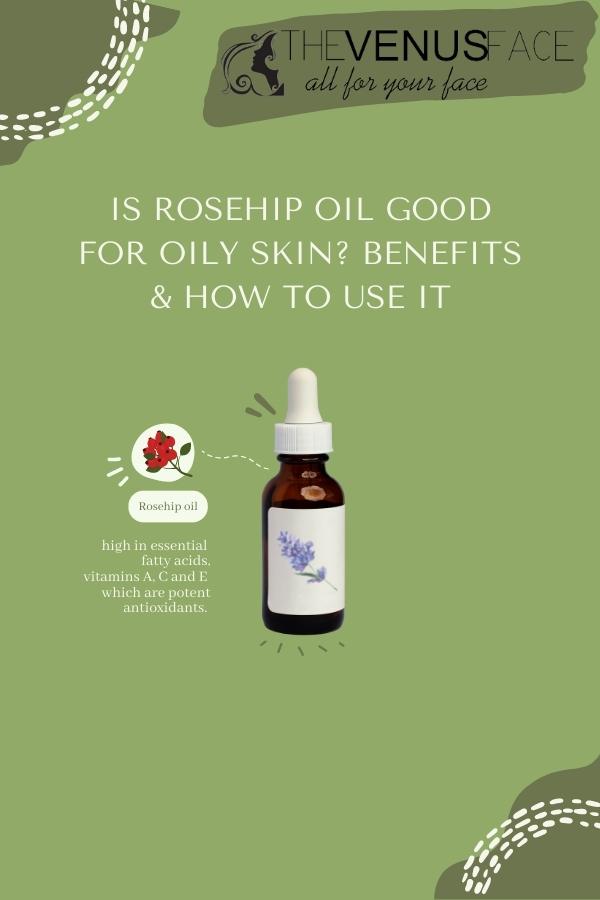Is rosehip oil good for oily skin? Learn more in this post.
Oily skin is the bane of many people’s existence. It can make you feel as if your face is covered in a layer of grease, and it never looks good on anyone. There are many causes of oily skin, one of them is the lack of hydration on your face, which makes the sebaceous glands work overtime to produce oil, this over-produces sebum, which is the oil your skin produces to keep it moisturized.
To treat it, many people use natural oils to compensate for the lack of sebum their face produces. Coconut oil, for example, is very common in many beauty products because it has natural bacteria-fighting compounds that can kill acne-causing bacteria.
Besides coconut oil, rosehip oil is also a very popular oil for the skin and is commonly used in many skincare products, but, is rosehip oil good for oily skin?

Does rosehip oil help oily skin?
Yes, it does. Rosehip oil is non-comedogenic so it won’t clog your pores, which means you can use it on oily skin without worries. Rosehip oil is a skin-balancing oil, which means it helps to reduce excessive sebum production in oily skin.
More: Is Shea Butter Good for Oily Skin?
Best pure rosehip oil for the skin
Benefits of rosehip oil for oily skin
Rosehip oil is a carrier oil, which gives many benefits to the skin generally. Besides that it is non-comedogenic, thus people with oily skin can use it without fear, it is especially suitable for oily skin because of its balancing properties.
Rosehip oil has a high concentration of antioxidants, particularly vitamin C. Antioxidants may assist to counteract the damaging effects of DNA-damaging molecules, which means it may help prevent the signs of premature aging, such as wrinkles and fine lines.
More: Is Tomato Good for Oily Skin?
Keeping skin hydrated
Because rosehip oil contains linoleic acid, it is even better at retaining hydration than your sebum alone. Rosehip oil prevents moisture from leaving, which makes it a great choice for oily skin types, as it helps to regulate the amount of sebum that is produced. It also helps to keep dry skin hydrated.
Anti-aging effect
Rosehip oil is also a great choice for every skin type. Its anti-aging properties help to fight free radical damage, while its hydrating effects minimize the appearance of fine lines and wrinkles thanks to its antioxidants like vitamin E, C, and A. More: Oily skin looks younger.
Diminishing scars, skin discoloration & hyperpigmentation
Rosehip oil is known to have various benefits for the skin. One of these benefits is that it can help to diminish scars and hyperpigmentation. This is because the oil helps to keep a wound moist, which may prevent scars from forming in the first place. Additionally, rosehip oil can also help to reverse some signs of scarring. Besides that, hyperpigmentation and skin discoloration can be improved when using this oil too. All of those effects are coming from the vitamins and carotenoids as well as linoleic acids.
More: Top CC Creams for Greasy Faces.
Help acne-prone skin
Oily acne-prone skin is difficult to care for. The skin is shiny, you often have blackheads and your pores become clogged rapidly. If this sounds like you, then not only are you in need of special acne-care products but also an effective skincare routine that nourishes the skin deep down.
Luckily, the retinoids in rosehip oil, help fight acne-causing bacteria, which means it may be beneficial for acne treatment too.
Softens Skin
Rosehip oil is a great emollient for softening and smoothing rough, flaky skin. It won’t leave your skin greasy after absorption
More: Is Honey Good for Oily Skin?
How to use rosehip oil for oily skin
There are 3 ways that you can use rosehip oil:
Applying directly
This is considered the most simple and effective way to use rosehip oil. Because it is a very lightweight oil, it quickly absorbs into the skin and doesn’t leave your skin feeling greasy like other oils do.
To make rosehip oil last longer and to ensure you get the full benefits of rosehip oil, apply warm heat to open up your pores first. Use a hot washcloth or simply run the bottle under hot water for 3 minutes. This will help to boost blood flow in your skin and open up your pores so that rosehip oil can penetrate deep into the skin.
You may also want to mix it with other carrier oils, which helps to preserve it longer than if you were just applying it directly on its own. However, don’t forget to patch test this oil first, to check if it doesn’t irritate your skin.
More: Is Almond Oil Good for Oily Skin?
Applying with moisturizer
This method is an excellent way of using rosehip oil while still including a moisturizer in your skincare routine. It can be quite effective when used alone but it’s even better when combined with a creamy moisturizer, which helps the rosehip oil to absorb into the skin quicker.
Make sure you pick a moisturizer that is light-weight and non-comedogenic, which means it won’t block your pores but will help the oil to get absorbed quickly on one end while still providing hydration on the other end.
When using this method, make sure to apply rosehip oil first and then follow it up with your moisturizer. The same way applies to tinted moisturizers.
More: 7 DIY Moisturizers for Greasy Face
Mixing with other essential oils
This is another way of ensuring that rosehip oil’s benefits are maximized. When you mix it with other oils, this will help to make the rosehip oil more effective and give you a more intense skin treatment. You can use rosehip oil in various ways when mixing it with other oils. For instance, you can add 4-5 drops of rosehip oil to a face oil blend for normal skin types. If you have oily acne-prone skin, then you may want to add more or use one that is already richer in linoleic acid.
Because rosehip oil doesn’t irritate the skin when used correctly, it is safe to mix it with other essential oils and carrier oils.
You can add it to face oil or serum, add 10 drops of the rosehip oil and 4-5 drops of frankincense oil to your moisturizer, or simply add 3-4 drops in with your favorite shampoo.
The best time you would want to use rosehip oil is at night since it can make your skin more sensitive to the sun.
More: 4 DIY Serums for Greasy Face
Final thought
Rosehip oil is a natural remedy that has many benefits for the skin. It can help to reduce the appearance of wrinkles, fine lines, and scars. Rosehip oil is also effective in treating acne-prone skin and restoring hydration to dry skin. You can use rosehip oil directly on your skin or mix it with other carrier oils or essential oils to create a more intense treatment. Make sure to apply sunscreen when using rosehip oil during the day, as it can make your skin more sensitive to UV rays.
F.A.Q
Does rosehip oil clog pores?
No, it doesn’t. Rosehip oil has a comedogenic rating of 1, which means it is unlikely to clog pores. Thus, you can apply it directly to the skin or use it as an ingredient in recipes.
Which is better for oily skin rosehip oil or jojoba oil?
Both rosehip oil and jojoba oil are beneficial for oily skin, but they have different properties that make them each effective in their own way. Rosehip oil is only able to penetrate the skin to the top layers, while jojoba oil is able to penetrate deeper into the skin. This is why combining the two oils is so effective – the rosehip oil is carried deeper into the skin than it would be able to go on its own, resulting in better overall skin health. Jojoba oil contains a number of vitamins and fatty acids that are beneficial for the skin, making it a great addition to any skincare routine.
However, if you have to pick one, then the jojoba oil is better because it goes deeper into the skin, thus helping you achieve better overall skin health.
Is rosehip too oily for acne-prone skin?
Despite the fact that rosehip oil is considered to be super oily, it is actually non-comedogenic and won’t clog your pores. This means it will help to heal your acne without making your skin oily in the process. Plus, rosehip oil contains vitamin A which is really good for acne-prone skin because it helps reduce the appearance of acne scars and helps to fight off free radicals.
Is rosehip oil bad for acne?
Rosehip oil is not bad for acne. In fact, it can help clear your skin and prevent acne from forming. The linoleic acid in rosehip oil helps regulate sebum production, which can prevent whiteheads and blackheads from forming.
References:





